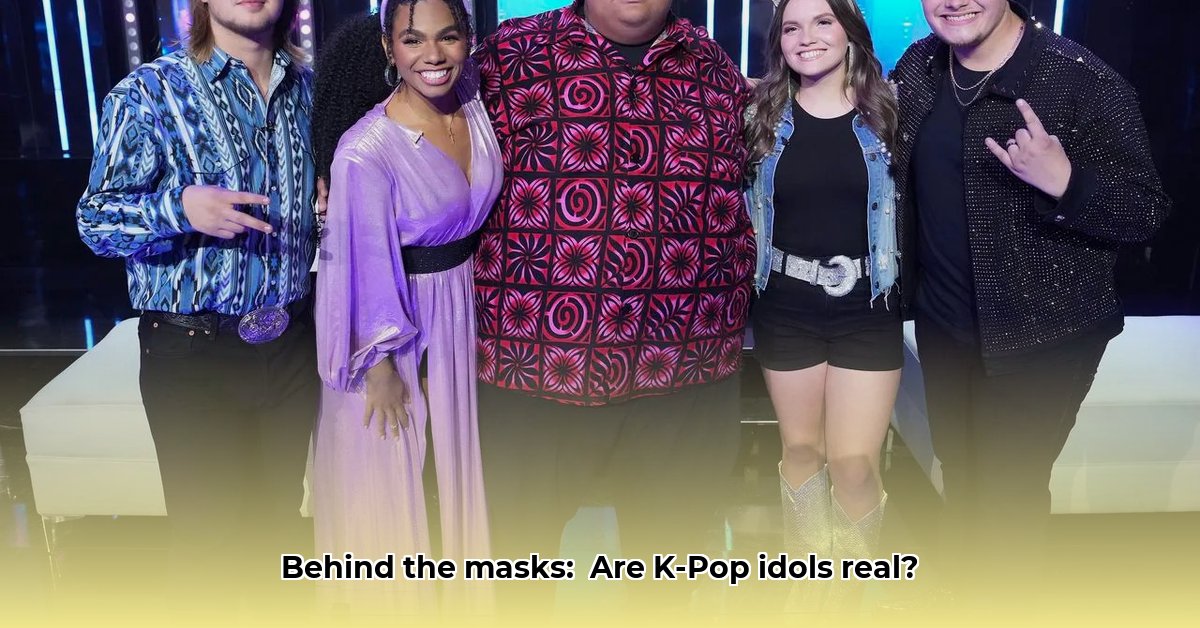Ever wonder if your favorite K-Pop idols are truly who they seem? The polished image, the catchy tunes, the perfectly choreographed dances – it all looks amazing, right? But beneath the surface of this dazzling world is a story of intense pressure, careful crafting of personas, and a whole lot of questions about what’s real and what’s not. This isn’t just about gossip; it’s about understanding how the K-Pop industry works, the sacrifices idols make, and how fans play a huge part in the whole picture. We’ll explore the ways idol personalities are created, the challenges idols face, the ethical issues at play, and the evolving fan culture that both supports and scrutinizes the industry. Get ready to dig deeper into the world of K-Pop and uncover some surprising truths about the line between meticulously crafted image and genuine self.
The K-Pop Machine: Manufacturing Dreams and Managing Realities
The dazzling world of K-Pop often feels like a perfectly crafted dream, filled with exciting dance choreography, shiny outfits, catchy tunes, and impossibly flawless idols gracing our screens. But behind the meticulously planned performances and perfectly filtered photos, a question lingers: are these groups genuinely who they appear to be? Or is it all a carefully constructed illusion? The truth, as you’ll soon see, is far more complicated than a simple yes or no. The K-Pop industry is a complex blend of talent, marketing, cultural influence, and rigorous management. Understanding this system is key to analyzing the authenticity of its stars.
The Illusion of Perfection: Crafting an Idol’s Image and Stage Persona
Imagine a team of expert image-makers meticulously sculpting a persona. That’s essentially what happens in the K-Pop industry. Agencies invest heavily in creating the perfect idol image – from catchy songs and mesmerizing dance routines to perfectly curated social media posts. Every detail is planned, every public appearance crafted to project a specific image. Think of it like a high-stakes theatrical production, running 24/7. The idols are the stars, but the agencies are the directors, choreographers, vocal coaches, costume designers, and stage managers, all working in concert to create a captivating show. This level of planning also extends to international promotions, tailoring content to resonate with diverse audiences.
This isn’t about saying the idols aren’t real people – of course they are! – but rather questioning how much of what we see represents the actual individuals behind the carefully constructed façade. It’s like looking at a beautifully painted portrait – it’s stunning, but it’s still just a representation, not the actual person. This “representation” often involves specialized vocal training, language lessons, etiquette coaching, and even plastic surgery, furthering the distance between the idol and their ‘natural’ self.
The High Price of Fame: Pressure, Expectations, and Mental Wellbeing
The pressure on K-Pop idols is immense. They face grueling schedules, often involving endless practice sessions, demanding performances, and constant travel. They must maintain a physique deemed ideal by the agency and the public, often undergoing intense diets and fitness regimens. On top of that, they’re constantly under the microscope of millions of fans and media outlets, scrutinized for every perceived flaw. Maintaining that “perfect” image – the flawless smile, the unwavering energy – is an exhausting, constant pressure. The toll on their mental health is significant, leading to documented cases of anxiety, depression, and even tragic consequences. Scandals, even minor ones, can derail careers and subject idols to intense online harassment. So, are these groups “real” in terms of their emotional well-being, given the immense strain to uphold an unrealistic ideal? How does this relentless public scrutiny impact the idols’ sense of self?
It’s a challenging question with no easy answers. The glamorous side of the industry often masks the sacrifices involved. It’s not just the idols who are under pressure; fans also play a critical role. While most fans offer unwavering support, some become overly obsessive, intensifying the already intense atmosphere. This creates a feedback loop where the pressure mounts, both internally and externally. Sasaeng fans, known for their extreme behavior and invasions of privacy, can further contribute to the stress and danger idols face.
The Ethics of Control: Who’s Really in Charge?
The power dynamics within the K-Pop industry raise serious ethical questions. Agencies hold significant control over their idols’ lives, often managing their careers, finances, living arrangements, and even personal relationships. This level of control can lead to concerns about exploitation and potential abuse. Are idols active participants shaping their images, or are they, to some extent, puppets in a carefully orchestrated system? The line between collaboration and control is blurry, and it’s crucial to consider the extent to which idols truly consent to the creation and management of their public personas.
This isn’t about casting blame; it’s about understanding a complex system with significant influence and power imbalances. Experts continue to debate the nuances of these relationships, examining everything from contract terms to the daily realities faced by these performers. The influence of social media also plays a role, as agencies monitor and manage idols’ online presence to maintain brand consistency and prevent controversy.
Evolving Fan Culture: Parasocial Relationships and Accountability
Fan culture surrounding K-Pop is dynamic and multifaceted. While supportive fan communities can offer a sense of belonging and empowerment, the industry also fosters parasocial relationships, where fans develop intense, one-sided attachments to idols. This can lead to unrealistic expectations and demands on idols, blurring the lines between personal and public life.
However, fan culture is also evolving, with increasing awareness of ethical issues within the industry. Fans are using their collective power to demand greater transparency, accountability, and better treatment of idols. They are actively calling out exploitative practices, supporting idols’ mental health, and advocating for legal reforms to protect artists’ rights.
The Path Forward: A More Human Approach to K-Pop
Ultimately, the long-term health and success of the K-Pop industry depend on addressing these systemic issues. Greater transparency in contracts, stronger legal protection for artists, improved mental health resources, and a shift towards more collaborative decision-making are crucial. Most importantly, the industry needs to shift its focus from pure profit maximization to the well-being of the people making it all possible – the idols themselves. This is not just about ethics; it’s about sustainability. A system that burns out its talent will eventually burn itself out, like a shooting star across the sky of the music industry. Encouraging idols to express their individuality and authenticity can foster stronger connections with fans and create a more sustainable and fulfilling career path for performers.
The question of whether K-Pop idol groups are “real” isn’t about uncovering a simple hidden truth; it’s about acknowledging the complexities of the industry, the pressures placed on performers, and the ways in which manufactured images shape public perception. It’s a conversation that requires a nuanced understanding, a balancing of the glamorous façade with the often-difficult realities behind it. The discussion continues, evolving as researchers delve deeper into this fascinating and multifaceted world. The future of K-Pop may well depend on finding a better balance between the manufactured and the genuine, fostering an environment where idols can thrive both as performers and as individuals.
How to Identify Ethical Concerns in K-Pop Idol Contracts: Navigating Complexities
The dazzling world of K-Pop often hides a harsh reality: potentially exploitative contracts. These agreements can significantly impact idols’ lives, leaving many questioning the authenticity behind the carefully crafted image. But how can we, as fans and observers, better understand these often opaque agreements and spot potential ethical red flags? Contract negotiations can be intimidating, especially for young performers who may lack legal expertise and bargaining power.
Unpacking the Contractual Landscape of K-Pop Agencies
K-Pop agencies invest heavily in training aspiring idols, often starting at a very young age. This investment creates a power imbalance, often resulting in long and restrictive contracts designed to recoup those initial costs. These “slave contracts,” as some call them, can stretch for seven to fifteen years, with clauses dictating almost every aspect of an idol’s life, from their finances and personal relationships to their appearance and online behavior. Are such extensive restrictions justifiable in the name of recouping investment and maintaining the group’s image? In the intricate web of the entertainment scene, how to identify ethical concerns in k-pop idol contracts begins with a careful examination of these contract clauses.
Red Flags in K-Pop Contracts: What to Watch For in Fine Print
Several key elements signal potential ethical issues. Prohibitively long contract durations—far exceeding the seven-year limit recommended by the Korean Fair Trade Commission (KFTC)—are a major warning sign. Look for clauses restricting personal freedoms: dating bans, overly strict dietary limitations, control over social media presence, and limitations on personal travel. Unfair profit sharing, where idols receive a disproportionately small share of their earnings after deductions for training, living expenses, and marketing costs, presents another significant concern. Lack of transparency surrounding finances, making it difficult for idols to understand how their earnings are being calculated and distributed, further compounds these issues. Do these idols have enough creative control over their music and image, or are they simply puppets of the agency? Severely punitive clauses for contract breaches, even for minor infractions, also warrant scrutiny.
Beyond Contract Clauses: Systemic Issues and Vulnerabilities
Beyond the specifics of individual contracts, broader systemic issues deserve attention. The A&R (Artists and Repertoire) model, while common in the music industry, can create undue pressure and vulnerability among young artists within the intensely competitive K-Pop ecosystem. The pressure to maintain a flawless public image, coupled with grueling training schedules, can impact trainees’ mental and physical health. The lack of independent legal representation for idols
- In Home Voice Lessons Near Me Offer Expert Instruction - February 2, 2026
- Find Voice Teachers for Adults Near Me to Start Singing Confidently - February 1, 2026
- Local Voice Coaches Unlock Confidence and Technique for Singers - January 31, 2026










